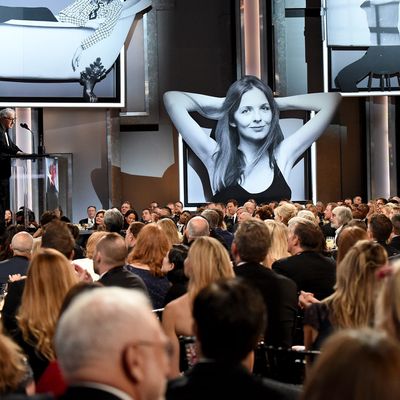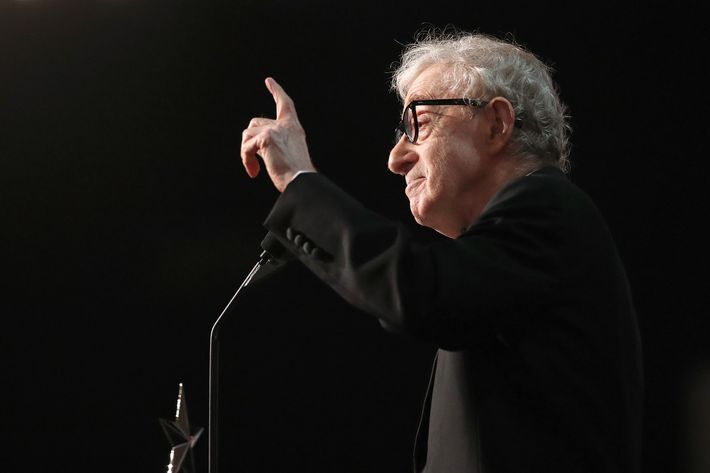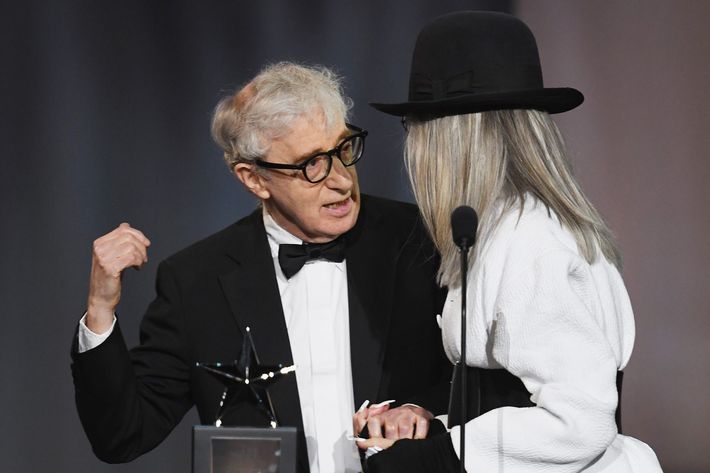
A friend asked me, a few months back, whether I’d seen Woody Allen’s speech at the American Film Institute tribute to Diane Keaton in June, when she was awarded the AFI Life Achievement Award.
I hadn’t. I’d seen most of the event. It was shown on TCM, and I often have TCM on in the background. But I’d turned the sound down when Allen made his surprise appearance at the end.
I don’t like Woody Allen and haven’t for a while — since around 1979, when he made a movie about a self-involved, middle-aged comedy writer dating and dicking around a 17-year-old. I thought Manhattan was creepy, but not half as creepy as the way Allen got lionized for basically filming his own life in black-and-white and giving it a Gershwin soundtrack. So I missed the part of the AFI tribute when Allen proved, yet again, that being him means you can do almost anything and get people to shower you with praise.
“He did what?” I asked my friend.
“He called her a ‘fellatrix.’ I think that’s what he said.” She was sounding a little less sure now.
She warned me that the video clip of the speech on YouTube, while short, was hard to take, but said I should watch it through to the end.
Much of what I’ve accomplished in my life I owe, for sure, to her. She’s really astonishing. This is a woman who is great at everything she does — actress, writer, photographer, fellatrix, director. Diane Keaton, winner of the 45th annual AFI Life Achievement Award.
I called my friend back.
“Is that what he said?” she asked.
“That’s what he said,” I said.
“And that’s what it means?”
“That’s what it means: ‘a woman who gives blow jobs.’ Only he pronounced it funny, almost as though he were speaking Latin.” I embarked on a lecture on how the word fellatrix should be pronounced in English — with a long a, like dominatrix. Or like fellatio. Allen had given it a flat a, so that it rhymed with the plural of Patrick. We set about pronouncing the word fellatrix, and then fellatio, with long a’ s and short — and also dominatrix, but mostly fellatio and fellatrix — back and forth, over and over, until we were helpless with laughter.
I was still laughing when I went to bed that night. But I keep thinking about Allen’s speech, especially as his character has come under increasing scrutiny in recent weeks. Yesterday, Alec Baldwin went on Twitter to defend Allen against his stepdaughter’s account of having been molested by Allen as a child. Baldwin called Dylan Farrow a liar — an actress, in fact, suggesting that the rage and anguish she has expressed at what she’s perceived for decades as Hollywood’s complicity is a performance. But of course, Allen is the veteran actor in this scenario. If you look closely at his own performance at the AFI tribute last spring, you can see some of the tactics he uses to project a demeanor of plausibility and harmlessness, and how they mask the deliberation and craft behind his routine. You can also watch him making Hollywood complicit before your eyes.
Allen’s speech at the AFI tribute to Diane Keaton was an example of stealth misogyny. He engineered things so that at the climax of the award ceremony, when everyone thought they were applauding Keaton, they were actually applauding him for demeaning her. Allen was the very last speaker; he was to present the award in the next moment. So he knew that, no matter what he said, at the end of his speech everyone would jump up and cheer. By dropping the word fellatrix into the list of Keaton’s professional accomplishments, though, Allen completely undercut everything he seemed to be saying. And by giving it an unconventional pronunciation, he made it unlikely that anyone would understand or be sure what he’d said.
It’s a classic–if byzantine–example of how covertly abusive men force or seduce others into collusion. The AFI tribute to Diane Keaton was covered by five or six industry publications, but none of them commented on Allen’s use of the word fellatrix in his speech. In general, most of them characterized it as a comedy routine or a roast that ended in a loving tribute. Which isn’t at all what it’s actually like. What you miss on the page are the mannerisms, the fake pauses and stammers, the gestures (Allen bringing his hand to his face, fingering his lip, playing with his ring) that made it seem like he was nervous or considering what to say, creating a patina of spontaneity.
It’s a highly rhetorical speech, for all the assumed hesitancy, full of devices drawn from classical oratory as well as classic misogyny. Allen starts with a coercive joke, likening Keaton to “the fictional movie character Eve Harrington.” (The audience is forced to laugh or risk giving people around them the impression that they’ve never seen All About Eve.) “Which is not to suggest,” Allen goes on, “that Diane, when I met her, was ruthlessly ambitious.” That’s called “praeteritio” — where you say something in the act of saying that you’re not going to say it. But the rhetorical flourish there isn’t in the words so much as in the moue of disgust Allen makes after he says “ruthlessly ambitious” — an expression which seems to be saying, “And that’s putting it mildly.”
The speech relies heavily on a combination of aposiopesis (breaking off from speech and not finish a thought), paralepsis (drawing attention to something by seeming to ignore it), and a kind of non sequitur (sometimes called anacoluthon), where you purposely start a thought in a way that creates a false expectation as to how it will finish, then change direction. One striking example of this occurs when Allen is talking about Keaton’s appearance. “She dresses, as you know, to hide her sexuality — and always has, and has done a great job, ’cause it’s never emerged over the years. But,” he goes on, “she’s a beautiful girl.” It feels there as if Allen is going to say something nice, or quasi-nice, or not awful. Then he finishes, “And she’s never succumbed to any face work or anything. She’s very uncompromising. She prefers to look old.” (At this point the camera dwells briefly on Reese Witherspoon, looking at her phone and shaking her head, a pasted smile on her face.)

Another impressive example of rhetorical non sequitur comes right after this, when Allen starts talking about what great, good friends he and Keaton have remained, how they walk the streets talking. He starts naming things they discuss: her career, movies. He’s counting off topics with one hand now, creating the impression that he’s going to go on with the list. Then Allen pauses and glances up, and something in his tone makes you think that he’ll go for a disparaging joke about how Keaton is too shallow to appreciate the brilliance of Ingmar Bergman or Citizen Kane. But he adds “her love life” to the list. And here’s the shift: As Allen says this, he becomes animated for virtually the first time in the speech. “She’s been involved with half a dozen of the most gifted, charismatic, attractive men in Hollywood” — he seems sincere now, and truly engaged in what he’s saying — “and it’s very interesting” — he raises one hand in a pedantic, academic gesture, as though about to prove the existence of God — “’cause every one of them has dumped her.”
There’s a photo of this moment (above). Allen stands at the podium, arm and finger raised didactically, and you can see the smirk of spiteful satisfaction that graces his features as he delivers that line. There’s another of Allen standing with Keaton at the podium, clearly telling her he can’t stay, that he needs to skedaddle. (He’s gesturing with his thumb toward some fictional exit.) A third photo shows Allen skedaddling. You can see what a hurry he’s in. (Perhaps he was worried that someone would call him out on how you pronounce the word “fellatio.”) Here, the smug little smile is chilling.
None of the press coverage, it seemed to me, had captured the spirit of either the speech or Allen’s intent. And no one commented on the barbed ending. Deadline had Allen “getting serious to tell the audience that much of what he has accomplished he owes to her.” Vanity Fair described Allen as delivering “a roast … before ending on a serious note and ducking out as quickly and quietly as he arrived.” Only one account quoted Allen in full and did so without comment. So it was almost as though the incident had never taken place.

Still, what could they have done, all those publications? They could quote what Allen had said, or they could censor it, or they could dance around it. Most had chosen to dance around it. Why — because they like him? No, because they like her. And it would have been more demeaning to Keaton for anyone to focus on what Allen had actually said. You had a choice between feeling complicit if you compounded the insult by mentioning it, or actually being complicit if you didn’t. By avoiding the whole matter, they became complicit, but they didn’t actually do anything that would hurt Keaton.
Allen really is a genius. He figured out a way of doing something vile that nobody could stop and that wouldn’t be described. He manipulated everyone, making all of A-list Hollywood complicit and putting the whole entertainment-media industry in a bind. It was brilliant: a textbook example of how covertly abusive men make others complicit in their abuse. Right out there in the open, for everybody to see. And nobody could talk about it, so that — on top of everything else — it was as though Allen was thumbing his nose at everyone.
Just recently, I learned a new word and had another idea about Woody Allen at the AFI tribute to Diane Keaton. I decided that he was “negging” her — like guys in bars who try to discombobulate women they regard as out of their league by walking up to them and insulting them with statements that sound superficially like compliments. Everything Allen said had sounded like it was leading up to something flattering or positive that never came. The men she’d gone out with were “some of the most gifted, charismatic, attractive” in Hollywood, but he hadn’t said that about her. He’d called her a beautiful girl, before going on to describe her as “uncompromising” for choosing to “look old” now (something Hollywood never forgives women for). He’d mentioned her books and her filmmaking and her photography, but hadn’t said that he liked any of it or that she was good at what she did — until the very end, when he’d stuck in that word, undercutting whatever else he was saying. Fellatrix was no roast. In a roast you pause for the laugh, and he hadn’t paused for the laugh.
There’s another famous bittersweet tribute to a lost love that I keep thinking about: “When you are old and gray and full of sleep / And nodding by the fire, take down this book / And slowly read and think of the soft look / Your eyes had once …” That’s William Butler Yeats. I can’t imagine Allen not being familiar with the poem. Knowing Yeats is so much a part of that whole New York-Jewish-intellectual-liberal-arts gestalt he’s always tried to seduce audiences with — a dynamic, I might add, that I was raised on. Perhaps Allen was Yeats-ing Keaton in a horrible sort of way, hoping that someday, years hence, she’d want to relive her moment of glory and take down the disc and watch it and see what contempt for her he really had. I can’t fathom it, wanting to do that to someone. But it makes me wonder what else a guy with that capacity for malevolence would resort to. Because what Allen did at the AFI tribute is exactly what abusers do: committing acts they think no one will talk about and delivering blows they think no one will see.




